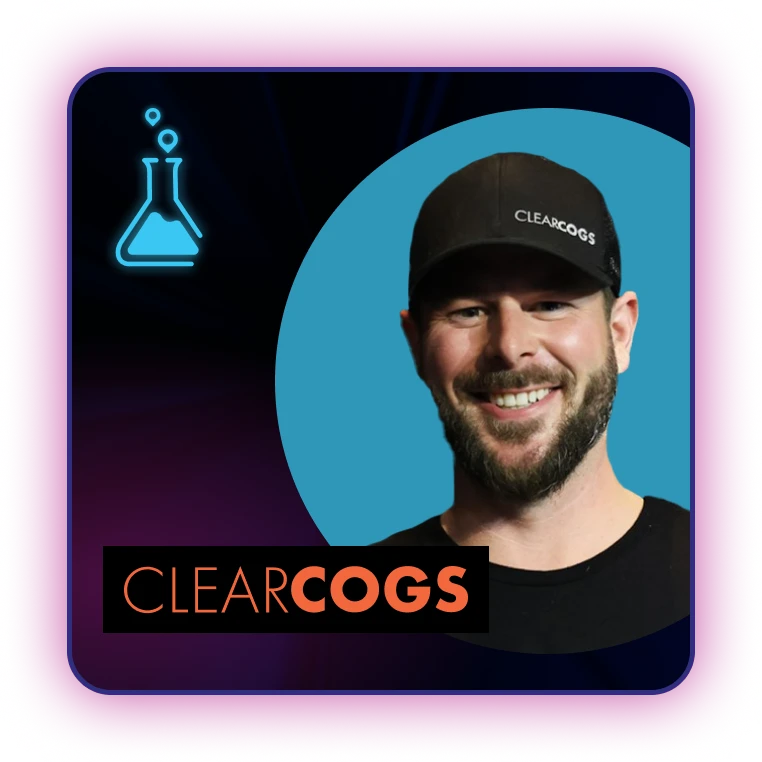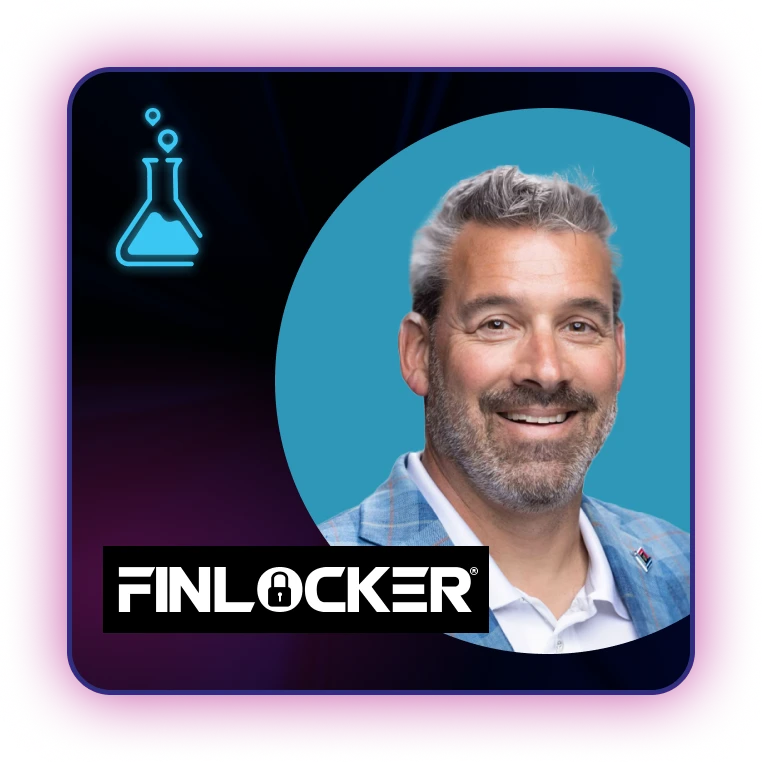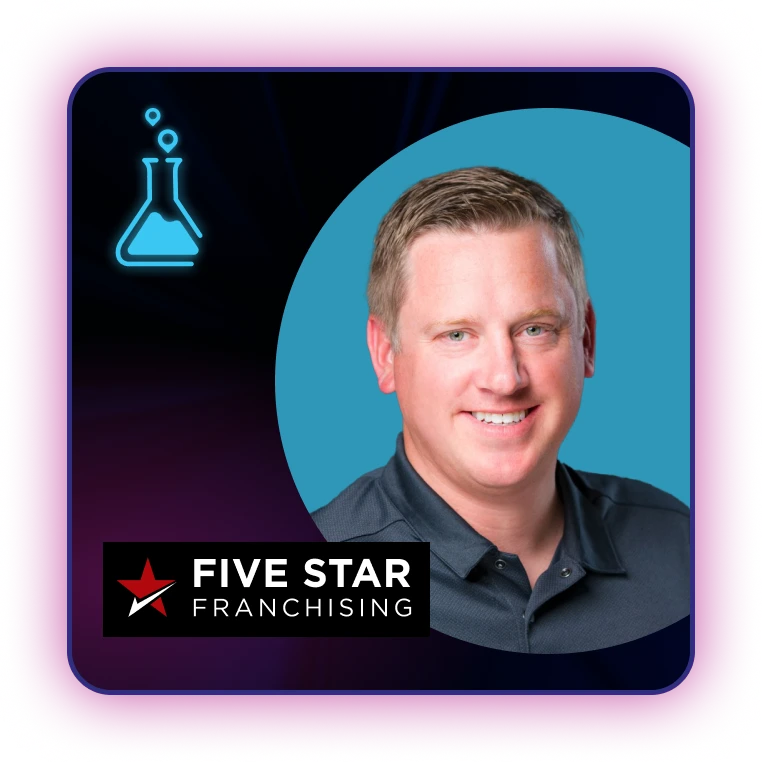< All episodes

October 11, 2023
Social media video: Why authenticity wins
with James Duncan
Director of Marketing at Thrive Mortgage
Summary
Are you looking for effective ways to nurture potential customers, get more leads, and spread brand awareness? Learn how to use social media video to get more business!
In this episode of the Local Marketing Lab, James Duncan, director of marketing at Thrive Mortgage, shares how to use social media video to get more business and help you achieve exponential growth. Everyone in the organization can play a part by sharing their own stories and creating videos. With authentic, engaging videos you can educate your audience and naturally drive social media engagement.
Engage and educate your audience
As the digital landscape continues to evolve, it’s crucial for everyone — loan officers, real estate agents, and restaurant owners — to engage and educate their target audience with meaningful content. Crafting material that connects with potential clients and solves their specific needs, such as educational videos on the mortgage process, can build trust and establish your authority in the field. Authenticity and genuine connection are key components that make content relatable, thus sparking viewer interest and increasing the likelihood of a successful customer journey.
Drive social media engagement
Optimizing the utilization of social media platforms can greatly enhance brand reach and engagement. Selective focus on one platform at a time and generating high-quality, relatable content can help foster stronger relationships with your audience. Incorporating stories and experiences into posts allows for personal connections, strengthening the brand, driving engagement, and potentially leading to business growth. All of this is incorporated into social media video to get more business.
Key Takeaways
In this episode, you’ll learn:
- The importance of establishing yourself as an expert on social media
- How to create authentic and educational social media video to get more business
- Tips to boost social media engagement and drive business growth
- The power of storytelling in your video content and social media posts to captivate your audience
- Insights to stay ahead of the competition by embracing innovation and experimentation with new marketing techniques
Consumers do not follow brands, they connect with humans.
JAMES DUNCAN

Resources
- Connect with James Duncan on LinkedIn.
- Check out Thrive Mortgage’s website and social media pages.
Other shout-outs
- Andrew Pawlak, founder and CEO of Rebel IQ
- Mike Faraci, videographer at Red Button Media
- Thrive Mortgage Ohio team: Nick Steinhauer and Kreg King
Transcript
Justin Ulrich
But I can’t stop looking at your face so maybe I’ll look into the camera.
James Duncan
I don’t know how to process that, but thank you.
Justin Ulrich
What’s up everyone, and welcome to the Local Marketing Lab, where you get real-world insights from industry pros to help you drive local revenue and local for growth. This podcast is brought to you by Evocalize – digital marketing tools powered by local data that automatically work where and when your locations need it most. Learn more at evocalize.com.
What’s up, everyone, and welcome to the Local Marketing Lab. Today we have a really, really interesting guest. He’s got over 20 years of mortgage and real estate experience. He’s been recognized as both an industry insider and a marketing leader by HousingWire. He’s got a traveler’s soul and is a huge fan of the band Rush and is the Director of Marketing Engagement over at Thrive Mortgage. James Duncan, thank you for joining us in the lab.
James Duncan
Absolutely, Justin. Thanks for the invitation. Happy to be here.
Justin Ulrich
You bet. Yeah, this is an exciting conversation. We’ve got a mutual friend that we’ve both worked with and he gave a recommendation to check you out and you’ve got a really cool background and you’ve generated some really cool content. So I’m excited to hear what you have for our listeners.
You know, I think it would be good for our listeners. It was good for me to go through your background. If you wouldn’t mind just taking us through a little bit about your background and your role over at Thrive Mortgage.
James Duncan
Well, I’d be happy to. I started in the real estate industry working for a custom home builder in the Austin area and that’s where I really kind of cut my teeth on learning all the ins and outs of this side of the transaction. I’d seen a lot of this stuff on the consumer side and just knowing what I knew based on personal research that I was doing as a consumer.
But I’d always had a dream of being in real estate in some capacity and growing up, I thought it was going to be on the home building side. And when I joined that home builder, I thought I had landed my dream job. I was going to do it for the rest of my life. And I was working with clients on designing their dream homes and these were kind of higher end homes, so dealing with some high net worth individuals and they had very exacting tastes and details.
And so it was fun working with the architects and the designers and seeing something start from the ground up and being able to drive by and point to it and tell my kids, hey, I did that or I was a part of that. That was really cool.
The unfortunate thing about that particular company is that the owner of the company, stretched the company a little too thin financially and tried to get a little too aggressive on their expansion plans. And then two thousand seven, eight, nine came along and the bottom dropped out of everything. And unfortunately, our company, or the company that he had started was left standing.
When the music stopped, that forced me kind of to transition to other things. And while I was working for that coastal home builder, I knew that I also wanted to get my Realtor’s license, so I did that. So by the time that company went out of business, I had my Realtor’s license, so I had something to fall back on.
So I was a Realtor for a few years, but given what was going on in the real estate market during that time, I had two small boys and I knew that it was probably a better priority to have some semblance of job security and some stable income coming in. So I became a teacher, I became a public high school teacher, was a teacher for about five years and still maintained my Realtor’s license, did occasional deals on the side just to supplement income, and discovered that I was really good at teaching.
And it was something that just kind of came out of me naturally. I come from a long several generations of teachers, so it’s kind of inbred into me and I wouldn’t be able to escape it if I tried. So I never really, I don’t really refer to myself as a coach. I refer to myself often as a teacher. And I think that there is a distinction between the two.
So got into teaching, got disenfranchised with being a public high school teacher, not because of the kids, but because of what? Well, first of all, teachers are criminally underpaid.
And number two, the things that the folks at the district level and at the state level require teachers to do now is really counterintuitive to how good teachers operate. Instead of just giving them total control of their classroom, letting them instruct their students how they want, they put a lot of restrictions and a lot of clamps down on the creativity of being a teacher and engaging young people’s minds.
And I just got frustrated with that and so I left teaching, got back into real estate full time this time on the mortgage side. Got into the industry about 2012, 2013 on the mortgage side as a trainer and just grew from there and very glad I made the transition over to mortgage. Enjoyed my time as a Realtor, have unlimited respect for Realtors and what they do every day.
I would not be able to do that today, but really have gravitated to being on the mortgage side and learning everything about what’s involved in mortgage, how to craft the right kind of mortgage strategy for long term success, being able to market in this environment. And then just one thing led to another and just through hard work and proven myself, just worked my way up.
And in 2018 was tapped by our CEO to head up the marketing division here at Thrive. And that was right about the time that we went through a massive rebranding from our previous name to the name that we operate under now, Thrive Mortgage. And I’ve got an amazing team and have been able to build out an amazing team and we did everything in house and anybody who’s been through rebranding knows what a herculean effort that is.
And normally you’re going outside, you’re working with design agencies, PR firms, all that. We did everything in house. We did all the design, all the videos, all the voiceover narrations, all the media, all the PR, all the press releases and everything. We did everything in house and that was an incredibly educational project to tackle and everything else. We’ve just kind of grown from there.
Justin Ulrich
Very cool. No, that’s such a cool story.
James Duncan
Thanks.
Justin Ulrich
I do love that your experience goes across. It just runs the gamut. So you have experience on the local side being a realtor, doing your marketing for yourself and now you have experience working for a much larger organization, helping others at the local level do their marketing.
So what are some things that you think that you’ve seen or done that really move the needle from a local marketing standpoint? And that could be for brands, branches or LMOs.
James Duncan
It’s interesting because that answer is as varied as the number of people that are in the mortgage industry because it really depends on what your end game is.
And I’ll address the first part of this answer to my counterparts at maybe marketing directors or heads of marketing, other organizations. When it comes to branding for your company, for your corporate brand in the mortgage space, it actually has a greater impact on your recruiting than it does on consumers. Because consumers do mean unless you’re Nike or Apple or Amazon, consumers do not follow brands, not typically.
And I mean there might be your one offs where you’ve got like everybody follows the Wendy’s Twitter account because they want to see the latest flame job they’re going to do on Denizen but Gold for the most part consumers don’t follow brands. They’ll watch ads but they connect with humans, they connect with other people.
So as far as your branding goes, you need to be thinking of it through the concept of what’s going to educate your consumer on what it is that you specialize in. If it’s a particular program, educate them on that. If you run the full gamut of you do any kind of loan program then educate them on other things that are solving their problems.
Because if an ad is just put out there just to say hey, we’ve got this, great. But if it doesn’t solve a consumer’s problem or you’re not explaining to them how your product or how that solution solves their problem, then it’s a nice bell and whistle that they’re not going to pay attention to and you’re going to be forgotten just as quickly.
So when it comes to marketing your corporate brand, you have to engage in what it is that you specifically want your consumers to know about you the most and that’s the way that they’re going to identify with you. And then when you’ve got loan officers in their local market who are echoing that same sentiment and putting out content that says the same thing, then that creates a connection. They’re like, oh, I’ve heard of that company.
And then they gravitate to that local professional who’s in your local market. So there’s a way that there can be a symbiotic relationship in that where the corporate branding and the corporate efforts that you’re doing from marketing standpoint are benefiting that local loan officer and it results in business that’s on the corporate brand side, on the local loan officer side, or even realtor side. But we’ll just call it the local real estate professional side.
You have a different task ahead of you. Brand building is a component of kind of what you’re doing, but it’s less impactful if your consumers don’t see you as the ultimate solution to their problem. And so from a personal level, you need to be okay with video. If you’re not doing video, you really need to give that some strong consideration.
Maybe it’s for you, maybe it’s not. Everybody’s reasons are different for why they do it. But whatever content you are producing, it needs to be educational in nature. You need to be putting out content that is going to engage them in a way that similarly to, sorry, I’m kind of dancing around here. But similarly to how corporate branding is all about educating and solving their problem.
You’ve got the same issue ahead of you, but you just take a different tactic or a different approach in doing it. So there are some people here at Thrive that call me the face of Thrive. I don’t particularly like that moniker and that’s one of the reasons why you don’t see my face on a lot of our corporate stuff because I don’t want that association. Because Thrive is not one person. Thrive is our entire community and everybody at Thrive is the face of Thrive.
But when it comes to the local loan officer, you really need to be doubling down on the content that is going to separate you from the rest of the noise that’s out there. And that’s going to really elevate you to the level of that’s the trusted professional in my market that I want to work with. And that needs to be what’s in the mind of the consumers.
If all you’re putting out on social are graphics or videos or content that’s provided from somebody like me, you’re doing it wrong. Because the content that we provide to our loan officers is not intended to be their sole source of content. It’s intended to be a supplement to the other content that they are producing themselves. Hopefully, that was a very long way of answering a very simple question. Hopefully I did that.
Justin Ulrich
It was no, it was a great answer. I think you touched on a lot of great things. The one thing that stuck out to me is when you said, for some folks like video, for whatever reason, it just may not be for them. But video content is so valuable. It’s the reason why we do things like the video version of a podcast.
It’s something where you could take the long form version that you’re creating in the video and you could cut it up into little nuggets, bite sized chunks. You could serve it up in different ways, whether it’s on your social channels or your emails or whatever. It gives you so many different derivative pieces of content that you can give to your base to engage with them and to leverage that content to help engage your sphere in ways that make sense with content that resonates with them.
And it doesn’t have to be long. The little pieces you send out, make it short, make it sweet, give them something to chew on to stay top of mind.
James Duncan
Exactly right.
Justin Ulrich
So what are some things that you’ve seen done at a local level that you think has worked really well? Or maybe if there’s something that you’ve seen that maybe didn’t work so well?
James Duncan
Yeah, there’s a couple of examples I can give you. The folks that try and let’s just stay on the theme of doing video. The folks that try to do a video where it is very obvious that they are reading from a script and doing this with their eyes and looking at the camera.
Justin Ulrich
Oh, man, you caught me. You caught me.
James Duncan
Yeah, exactly. You can tell that they’re reading from a script, that there’s only so much scripting that you can do before it becomes stale and rote and meaningless. The videos that have the biggest impact on people are not the ones where you’re getting on to flip on the camera and defining DTI.
Nobody cares what DTI stands for. Nobody cares what it means. They care how it impacts them when it comes to qualifying or finding out how much mortgage they can afford rather than just what they can qualify for.
We actually just published a video on our corporate pages. Despite what I was just saying, I don’t want to be the face for my it was basically me talking and educating people on the difference between qualifying for a mortgage versus affordability of a mortgage and just spelling out this.
So you’ve got to engage in doing that kind of content where you’re speaking in terms that they can easily understand. And they have that light bulb moment like, okay, that makes sense.
The common mistake that I see people making when they get on video is number one, they’re thinking that they don’t have to practice. There have been any number of times where I’ve told a loan officer like, okay, I want you to record a video a day for two weeks and I don’t want you to post a single one of them. And they’ll say, okay, and I find out who’s serious and wanting to be coached in this regard are the ones who actually do that.
And the reason why I haven’t do that is because I want them to get comfortable pushing the button and looking at the camera and talking like it’s another human being. Because it’s amazing. I mean, I’m sure that you’ve experienced this as well. It’s amazing how many times even now, as long as I’ve been doing video as much as I’ve been on camera, especially internally, there are still times when I’ll flip on the camera and I’ve got a really good thought in my head and I just completely blank out. I’m like, what the heck?
Justin Ulrich
Every day for me, hey, I need.
James Duncan
To remember it’s something that just takes practice and you got to give yourself a little grace, especially if this is your first time into it. But one of the biggest mistakes that I see people making is, number one, trying to script their videos.
Number two, they keep using industry jargon and terminology and trying to define it, but that just extends the video further. Just put it in simple terms that they’re going to understand. Like how would you explain it to a consumer who’s sitting across the table from you? Are you going to throw out DTI and LTV and all the different acronyms that we love to use in the mortgage industry to somebody sitting across the table without any context? Probably not.
So eliminate the jargon and just speak plainly the way that you would to a consumer or someone who’s asking you questions.
The third mistake that I see a lot of people making and I just had it and it just left me just as quickly as I had it. But basically it was around the concept of trying to do too much in your video and trying to squeeze too much information into your video. Break it up. Break it up into three or four videos and you just got yourself another couple of extra days of content.
Justin Ulrich
Exactly.
James Duncan
Don’t try and answer every question in the video. Leave that for the chat, leave that for the comments. Have conversations there because there have been so many times where I’ve done a video where I intentionally did not answer every question in the video.
I just posed a question or addressed a particular issue and said, give me your thoughts down in the comments and questions were asked in the comments that led to additional videos. And so that’s part of the beauty of engaging with your community on social is that you find out because then that helps you find out what’s important to them and what do they really want to know?
Justin Ulrich
Exactly. And the more content pieces that you push out, the quicker you can accelerate your learning. So if you’re pushing out different video formats or types or different types of content pieces, whether it’s written form or video form, the more you push out, the more you can learn quickly what works and then just do more of that stuff.
But I do think that one of the things that we hinted at a little bit earlier is just start. Like you just have to get started creating something. I do like that you have them go through creating some videos so they could feel comfortable in front of the camera and do things.
Like one thing you do really well, James, is I could tell you’re looking directly in the camera where I’m looking in the screen at your face. So it looks like you’re engaging with me as a person when you look directly in the camera. But I can’t stop looking at your face, so maybe I’ll look into the camera.
James Duncan
I don’t know how to process that, but thank you.
Justin Ulrich
Well, hey, I think that was some really good words of advice there. I’d like to just ask if there was one thing that you’d recommend someone do today, just to start.
So let’s say they’re struggling to engage with their sphere. They’re struggling to drive business to attract more realtors. What’s something that they could do today to kind of turn that around? From a tactical standpoint?
James Duncan
From a tactical standpoint, that’s largely going to depend on the individual and what specific struggles they’re having. Because my response to somebody who has 100 great realtor connections in their database, but they’re struggling getting referrals from those 100 realtors is completely different than the younger LO who is trying to establish those realtor connections and can’t get anyone to take an appointment with them or can’t get his foot in the door. So it’s going to depend on what their problems are.
But if we’re limiting the response to social media and what they can do to engage their audience more on social media, I would say pick one platform. So if you don’t have an extensive community built on any specific platform, then just pick one. And I would recommend that you double down. Don’t ignore the other ones completely.
But let’s say it’s Instagram. Let’s say you want to beef up your community on Instagram. Then double down on that for the next two months and go all in. And when you make a post, don’t just make a post and then disappear for the rest of the day. Go make a post. Whether it’s a video graphic that you share, something like that, maybe a testimonial card, and share that out.
And don’t just say, hey, honored to get honored and humbled. And please stop saying that you’re humbled when you get recognized for something. Because if you’re truly humbled. You wouldn’t be bragging about it on social.
Justin Ulrich
You wouldn’t talk about it.
James Duncan
Can we get that out of it? Anyway, that’s another soapbox.
But go ahead and make a post. Whether a graphic or video, put it on Instagram, but instead in the caption copy, don’t just reiterate what’s clearly happening in the photo. If you’re at a close, like, let’s say it’s a photo of you at a closing at a title company with a family that just closed on their home. Tell me the story about the family. Don’t tell me, congratulations, Johnson family, on your new home. Hope you enjoyed for many years.
Tell me the Johnson story. Why is it significant for me to want to celebrate that with you?
One of my favorite stories that I’ve ever heard about a client story, and I’ll try and keep this as brief as I can. One of our branch managers helped a couple who was previously homeless living in their car. Child Protective Services had taken their kid because they were hooked on drugs and life was just in shambles.
And then they met this loan officer, and she helped them. And while they met her, they had a goal of getting home, getting their kid back, and getting clean and sober. So they were going through a rehab program, getting cleaned up. Christy was working with them on getting them going through all the steps that they needed to go through.
They had to get employed. They had stability. Anyway, she worked with them through the whole thing, and they eventually were I mean, long story short, they were eventually able to get the home. Shortly before they closed on the home, child Protective Services returned their five year old daughter to them, and they were a family again.
That is what gets me up in the morning, those kinds of stories. I mean, you tell me that story, okay, I want to get to know you a little bit better, and I want to follow you because I want to hear more stories like that. That is the power of storytelling on social media.
So you need to change your perspective on what social media is intended to do and what it can do for you. And it’s not just about you putting content out there. It’s also about you engaging with other people who are not just engaging with your content, but start engaging with other people that you really gravitate to the message that they’re delivering and watch what they do.
Most of the time when I’m on social media, I’m not digesting content through the same lens that other people are digesting it. I’m looking at how they’re structuring their video. I’m looking at trying to figure out, can I see what kind of mic they’re using? Can I determine what they used to put the video together and how they’re putting the captions in? I’m looking at all the little detail, things like that, because that helps me educate our audience even better.
So I would say if you’re lacking on driving business and you want to use social media as a cure for that, it’s not going to be an overnight cure, but pick one platform and double down on it for two months and see how that helps you.
Justin Ulrich
Very good. And that’s an incredible story, man. That would also motivate me to come to work, so I really appreciate you sharing that.
Well, James, and great words of advice as well, to kind of shift gears and get into some things that we learned about you, because content that we put together that’s authentic, that helps people get to know us better, like you talk about, that’s the stuff that really helps to create connection and bonds with your audience.
That’s why we like to call out cool, interesting things about our guests. One thing that I found out through not only my research, but you just basically sending the facts over to me that I asked for was that it looks like you really love to travel. You’ve been to both the Arctic Circle and the southernmost continuously inhabited city in the world. Not in one trip you mentioned. So you like to travel a lot and you go the distance.
Another cool thing was that you’ve earned your Eagle Scout at 13, which, hats off, I got to Life when I was 16. I stepped out of the program because I just got distracted. So that’s incredible that you’re able to do it, and you were able to do it by 13.
James Duncan
Thanks.
Justin Ulrich
And then the last thing that I thought was really funny, just totally bizarre. These are the types of facts that I absolutely love, is the things that you’ve never heard. So you played basketball with Roger Staubach in his backyard?
James Duncan
Yeah. When I was in high school, I played on a basketball team, and our point guard was best friends with one of Roger Staubach’s kids. And we’d go over there from time to time. Most of the time Roger was if he was there, if it was like Saturday, he was over in his gym.
He had a pretty impressive gym. I mean, this guy was in his fifties at that time and still looked like he could have held his own against some linebackers. And solid as a rock. He set a pick on me one time and almost went down as a high school basketball player. So that was a lot of fun.
Justin Ulrich
That’s incredible. So I was able to leverage AI and pull together what I envisioned as what was happening. He’s not in his 50s, but he looks like he’s still got the moves.
James Duncan
Yeah, he never wore that vest on his court, but yeah, he was a pretty phenomenal athlete. He had a real nice scoop finger roll, so he knew what he was doing. Cool.
Justin Ulrich
That’s cool. I know I did this last night and I was tired and it was really funny to me. The other thing I thought was pretty cool was that you’re an average Rush fan I’ve picked up from some of your other content. So I was really trying to get you into the moment and try to get you to become part of the band.
It was actually really tough to get AI to recognize anything about Rush. But yeah, I thought this is kind of a fun representation of you just shredding it in front of the audience at a Rush show.
James Duncan
That’s hilarious.
Justin Ulrich
Part of the group.
James Duncan
That’s hilarious.
Justin Ulrich
Awesome. Well, with know we like to give our guests an opportunity, James, just to give somebody a shout out who they think are doing something really cool, really interesting or engaging from a local marketing standpoint. So who would you like to shout out there?
James Duncan
A couple of folks. Number one, I’d say Andrew Pawlak, the founder and CEO of Lead Pops or well, now, Rebel IQ. And what he’s doing, he’s doing it more on a national level.
But the tool that he’s providing is helping local loan officers really stand out in their market and basically combat a lot of the lead aggregation services from a lot of the big names that are out there in the industry and be able to, as they say, take back their leads and just be able to get themselves in front of more people and leveraging digital marketing to do it.
Another big guy named Mike Faraci, he’s a videographer and he’s been in the industry a long time. It’ll actually be a really good interview for you guys to have on, but he’d been in the mortgage industry for 20 years or so and has originated loans, has been an executive at some top firms.
And they about a year ago, just kind of launched kicked off his own company where he is producing video content on behalf of both companies and individuals and just does a really good job, especially with the videos that he puts out there. So definitely give him a good follow. The name of his company is Red Button Media, I want to say, but if you just look for Mike Ferrachi anywhere on any platform, you’ll be able to find him.
And then the third is this is more addressing your question. There’s a couple of branch managers that we have up in Columbus, Ohio who are doing fantastic work both with video newsletters, all kinds of engaging in all different facets of digital marketing and outreach to their community and it’s paying off big time.
And their names are Nick Steinhauer and Kreg King. And Kreg is spelled K-R-E-G. But if you just they go by the Columbus team and our co branch managers and just doing a great job on just kind of elevating their brand and by extension the Thrive brand there in the Columbus market. So kudos to them.
Justin Ulrich
Very good. No, all very good shout outs, and I appreciate you having more than one. It’s incredible. A lot of people doing some great things out there. We appreciate you recognizing also, you know, tons of fun having you in the lab. We appreciate you coming on, giving our listeners some really good insights. So thanks a ton for joining us.
James Duncan
Absolutely, my pleasure. Happy to be here.
Justin Ulrich
As always, thanks for joining us in the local marketing lab. This podcast was sponsored by Evocalize. To learn more about how Evocalize can help you grow your business, visit evocalize.com.
If you learned something from today’s episode, don’t forget to subscribe on your favorite podcast platform and follow us on LinkedIn and Facebook at evocalize. That’s Evocalize and on X at Evocalize.
And remember, keep innovating and testing new things. You’ll never know what connects with your customers best unless you try. Until next time. Thanks for listening.

James Duncan
Director of Marketing at Thrive Mortgage
Meet James Duncan
James Duncan is a highly experienced professional with over 20 years of expertise in the mortgage and real estate industry. He has been recognized as an industry insider and a marketing leader by HousingWire. Currently serving as the Director of Marketing Engagement at Thrive Mortgage, James has played a pivotal role in the company’s rebranding efforts and has successfully built a strong in-house marketing team.
With a background in real estate and teaching, James brings a unique perspective to the table, allowing him to understand the intricacies of the local marketing landscape. His extensive knowledge and practical insights make him a valuable resource for loan officers and marketers in the mortgage industry who are looking to enhance their social media engagement strategies and drive business growth.

Justin Ulrich
VP of Marketing at Evocalize
Meet the host
Justin is a seasoned marketing leader known for his creative expertise and innovative go-to-market strategies. With vast experience spanning both B2B and B2C landscapes, Justin has made his mark across a spectrum of industries including software, POS, restaurant, real estate, franchise, home services, telecom, and more.
Justin’s career is steeped in transformative strategies and impactful initiatives. With specialties ranging from channel marketing and brand management to demand generation, his strategic vision and execution have consistently translated into tangible results.
Empower your franchisees.
Drive real local results.
Not every franchisee on your team is a marketing pro — yet.
Let’s change that. Reach out, and we’ll show you how!












